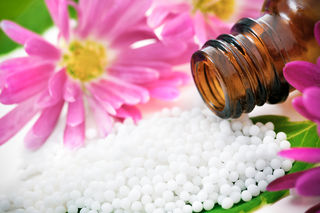
Depression
Feeling Blue? ‘Green Medicine’ Offers Answers
Safe, effective, natural medicines can relieve depression.
Posted February 6, 2014 Reviewed by Davia Sills

Natural medicines can offer positive answers to all the many reasons people seek alternatives to conventional drugs. The FDA considers them safe enough to classify as over-the-counter drugs. They are non-habit forming, and there is no rebound effect when stopping them.
Users do not build up a tolerance, gradually requiring increasingly large doses to gain the same effect. In fact, the reverse is true: Users generally need less and less until the medicine can be discontinued altogether. This is possible because natural medicine addresses the underlying imbalance or trauma, rather than simply masking the symptoms.
Sound too good to be true? These natural medicines, called homeopathic, have been around for 200 years, quietly healing all manner of emotional as well as physical ailments. They are part of the national health care system in many countries around the world but hardly known in the U.S., because of a lack of funds for research, advertising, and sales to physicians.
This lack of funds, in turn, is due to one of the great strengths of these medicines: They are not patentable, because they have been in the public domain for two centuries. During that time, there has never been a single recall of homeopathic medicine.
They earn the title “green medicine,” because they are made from natural substances, plus the manufacturing process does not dump toxins into the environment, as is true for many conventional drugs and medical devices. In this series on these “green medicines,” a different psychological condition will be addressed in each one. In this article, some of the top homeopathic medicines for depression will be compared by describing the person who typically needs them.
Whether the main problem is physical, emotional, or mental, homeopathic medicine is matched to many individual characteristics of the client.
Aurum metallicum is perhaps the most commonly used homeopathic medicine for depression, even including suicidal depression. The person who needs it tends to be very serious and responsible, with a sense of bearing a heavy burden. (One of my clients, after taking Aurum for depression, said, “I feel as if I’ve been walking around with a lead vest on, and I’ve finally taken it off.”)
They may be religious, with a devotion to impossibly high standards of spiritual perfection, and the slightest deviation from the path of righteousness can lead to deep depression. Even if they are not religious, they are likely to have a strong sense of guilt. They may find sweet relief from their heavy thoughts when they contemplate suicide, typically by jumping from a height or driving a car into oncoming traffic. The typical physical symptoms for people needing this remedy include heart symptoms (palpitations, arrhythmias), sinusitis, and headaches.
Natrum sulphuricum, or Nat. sulph. for short, is another widely used depression medication. Here there may be a physical causality, including a head injury or liver disease. People who need Nat. sulph. are likely to be victims of sudden mood swings, often including violent rages. They may have been misdiagnosed with bipolar disorder, when in fact, a homeopath would recognize the mood swings from inflammation of the brain following a head injury.
One way a homeopath will distinguish between the medicines for suicidal ideation is to note how the person would carry out their plan: The person needing Nat. sulph. will talk about shooting themselves in the head. (I apologize for the gruesome detail and include it here in the hopes that Nat. sulph. may stave off even one unnecessary death.) Homeopathic physicians recognize the symptoms of head trauma in the PTSD and violent rages of returning vets and wish the DOD would allow the administration of this medicine. However, it can also be used in much milder cases of depression, such as the little boy in my practice who became depressed after being hit in the head during an ice hockey game.
Natrum muriaticum, or Nat. mur. for short, is the most widely-used homeopathic medicine for the long-term effects of silent (unexpressed) grief: long-ago grief or loss about which the person may say, “I never shed a tear.” The feelings were so deep and so powerful that the person felt she had to control them or else fall apart altogether. Instead, she chose to suppress her feelings, to soldier on. On the other hand, she dwells on these past hurts and may hold a grudge forever.
In the case of a small child, she may come to the irrational conclusion that she lost her mother’s love because she wasn’t good enough to be loved. She then turns into a “good girl” who tries to do everything perfectly at school and becomes “deputy mom” with her younger siblings at home. She becomes a serious and responsible child who puts more pressure on herself for perfect grades than her parents do. As a young adult, she builds a wall around her wounded heart, holding potential close friends and romantic partners at bay, often with sarcastic witticisms, to protect herself from being hurt.
Once she allows someone in, past the citadel and moat she has constructed around her deepest feelings, she becomes a great confidant full of emotional depth. This type of person also appreciates the trust and the depth of sharing in psychotherapy, and once she has healed her own issues, she is likely to make a compassionate and supportive psychotherapist.
But if she is hurt again, whether by a breakup or the death of a loved one, she may retreat even further into emotional suppression and use sharp comments to keep people at arm’s length. Nat. mur. can help her overcome her depression by releasing long-ago as well as current hurts.
Phosphoric acid is used in carbonated soft drinks, and the medicine made from this bubbly gas is helpful for people who used to be social and outgoing, but who now describe themselves as emotionally “flat.” Instead of being the one to organize the best parties and social occasions, they now avoid contact by turning off their phones and isolating themselves at home. They may be physically exhausted as well, and I have used it for chronic fatigue when the person is emotionally flat.
Sepia is by far the most common homeopathic medicine in my experience for hormonal depression, and in fact, for all the hormonal events in a woman’s life, from menarche to menopause, including PMS, menstrual symptoms, pregnancy-related and perinatal symptoms. The typical symptom picture will sound familiar to overworked moms who may be juggling long working hours with more than their share of housework and childcare.
I’ve also used it for women with jobs where they are responsible for lots of people who keep begging or demanding their attention: nurses on an understaffed floor, teachers in an overcrowded classroom. These women may have a feeling of deep exhaustion, of needing a vacation, but if they do get away, they are just as tired on their first day back. The exhaustion leads to snappishness and weepiness.
“I don’t have a moment to myself” and “I’m at the end of my rope” are typical laments. These women may cry at the drop of a hat when pregnant or premenstrual; they typically control their short temper at work, then unleash it on their nearest and dearest ones at home. Lack of libido is another aspect of their lack of energy and desire to be left alone.
Typical physical symptoms include a dragging-down sensation as if the uterus were heavy or about to slide out; stagnation of circulation, leading to varicose veins and hemorrhoids; and lower back pain with the period.
Cimicifuga is another hormonal medicine, used when the woman describes a “black cloud” over her head, and when the depressed feelings are so intense, she will say, “I feel like I’m going crazy.” She may also report brain fog and an intense headache with severe neck pain.
In other words, it’s used for a symptom picture which is much less common than that of Sepia and much more intense. I have used it rarely compared to my frequent use of Sepia, but its effect has been powerful. For example, one young woman in my practice had been in and out of psychiatric hospitals for years with a diagnosis of bipolar disorder; her symptoms all cleared up after a few months on Cimicifuga.
Directions: Ideally, seek a professional homeopath to find the medicine best-suited to you. There are about 3,000 more beyond the ones described here! But to help you cope while locating professional help, get a mild 6c potency of the one that matches you best (probably online rather than in your health food store). Dissolve two pellets in your mouth as one dose.
Try taking it once a day until you can feel it starting to work, then back off, and let it keep working (like coasting on a bike). Do not repeat until the symptoms start to come back. If you do not get benefit from this self-dosing, it means you need a professional homeopath for the best possible results.
References
Johannes CK, van der Zee H. Homeopathy and Mental Health Care: Integrative Practice, Principles and Research. Haren, The Netherlands: Homeolinks Publishers, 2010.
Reichenberg-Ullman JL, Ullman RW. The Homeopathic Treatment of Depression, Anxiety, Bipolar and Other Mental and Emotional Problems: Homeopathic Alternatives to Conventional Drug Therapies Edmonds, WA: Picnic Point Press, 2012.



